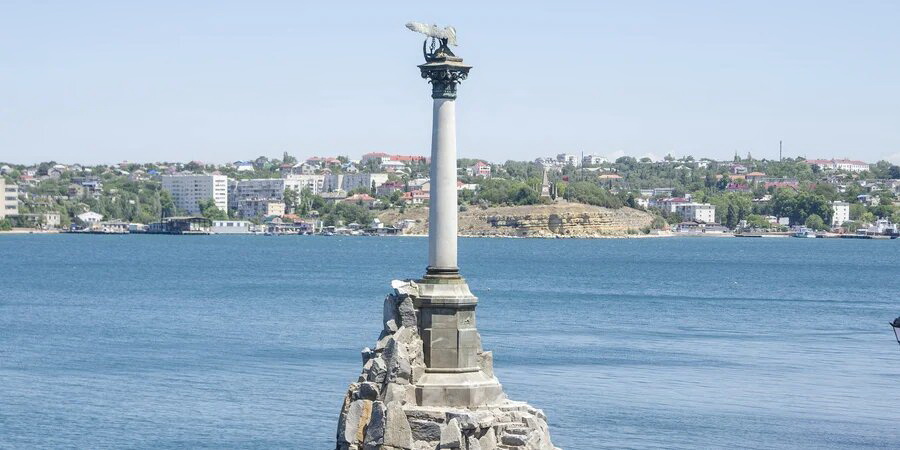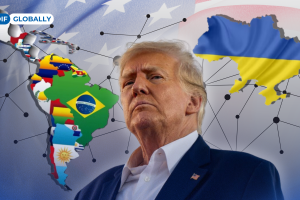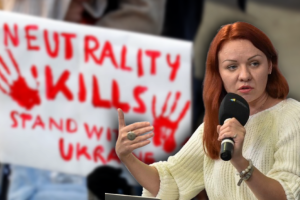How Putin is Trying to Outplay Us in Liberating Crimea – opinion

Source: NV
Putin's real goal is to place some kind of nuclear weapon on the territory of Crimea, to issue an ultimatum to the West that there can be no attempt at de-occupation.
No one should look for any betrayal in the interview with the deputy head of the office ofthe President of Ukraine, Andrii Sybiha, where he talked about Crimea. The methods of liberating Crimea have been discussed since Russia’s full-scale invasion last year.
Ukraine’s leadership has been discussing the methods of returning Crimea and has landed on the idea that military and political methods can be combined. And the experts (I am one of those experts) also tried to calm down many in the West, saying that to liberate territory, it’s not necessary to use military tactics reminiscent of the First World War, when one army goes into a frontal attack on another army. Step one is to reach the administrative border with Crime, it is necessary first to liberate the part of southern Ukraine that borders it. Suppose we manage to achieve this goal this year. In that case, it is quite a severe defeat for the Russian Federation and can trigger several other diplomatic and political mechanisms. Therefore, there is no betrayal in this Sybiha’s statement.
Talks about combining diplomacy and military methods at a certain point have been held earlier and are being held now. The most important thing here is that there is no question, either for Kyiv or for most of our partners (as it was before), that we will liberate Crimea, just like the rest of the territory of Ukraine.
In 2014-2015, when the events on the battlefield in Donbas were turbulent, Russia managed to convince the world that Crimea is a separate case, it differs from the Donbas, and now it differs even more from the territory occupied in 2022. This is the result of rather serious miscalculations of Ukraine in the information field in 2014-2015, when we separated Crimea from Donbas, did not activate the discussion about the return of Crimea in any way, and focused then on the Normandy process, on the Minsk tripartite contact group. In fact, before the creation of the Crimean Platform in 2021, there were no tools even to discuss the return of Crimea.
On the other hand, Russia worked very seriously on this topic and convinced not only the countries of the nominal Global South, but also many in the West, that Crimea is a special case.
But there is also good news.
This information campaign is nothing but an information construct. All of the propagandists’ hollow scaremongering shows that even when the war moves to the phase of liberating Crimea, and they threaten to escalate to higher threat levels, even nuclear, their rhetoric will prove to be just as hollow.
And we are making very serious progress with our public messaging in the West. In 2022, Western leaders were very cautious about returning to the 1991 borders and preferred to talk more about compromise. Gradually, Crimea, as well as the occupied part of Donbas, became an integral official public demand of the countries that always supported us in this case, for example, the eastern flank of NATO, Germany, and France. The Americans are still maneuvering around this topic, but officially they also support the territorial integrity of Ukraine, which is indisputable.
But there is another side to this coin, and this is precisely where Russia is trying to beat us. When it comes to the real prospects of de-occupation of the entire territory of Ukraine, we can still hear cautious proposals to consider behind closed doors from politicians and experts in the West. Now it sounds like that: think about how feasible it is, how many resources you have, whether it's worth it now, taking into account the losses, the resources needed to counterattack, and the potential losses we'll incur.
Russia is trying to use nuclear blackmail to stop us from using long-range missiles, for example, to destroy the Kerch bridge, the military infrastructure in Crimea, and the remnants of the Black Sea Fleet. The fact that Russia is bringing up this topic again now means that Kremlin expects to have to prevent the option of its military defeat on the battlefield in this way. This ultimatum is intended to stop the complete de-occupation of Ukrainian territories. It is not just idle talk. It must be responded to with appropriate steps.
My colleagues in Democratic Initiatives and I believe that there is a high probability of the deployment of tactical nuclear weapons on the territory of Crimea, and we believe that the fact that attention is now focused on the Belarusians should be perceived as only the first, but far from the main, step in this process.
Putin's goal is to place a nuclear weapon on the territory of Crimea, to issue an ultimatum to the West that there can be no attempt at de-occupation. Russia has prepared its domestic legislation for this. In 2020, Putin signed the Russian state policy on nuclear deterrence. It says it recognizes the right to use nuclear weapons in accordance with its domestic legislation if there is a threat to the Russian state by an attack on Russian territories with conventional offensive weapons.
Their narrative is that Crimea is Russia from the Russian point of view. In his latest address to the federal assembly, Putin stated that Russia is involved in an existential war where the country will no longer exist if it loses. It is not difficult to add one plus one to understand what Russia is trying to achieve. It expects that the West will not dare to arm Ukraine for a counteroffensive on Crimea if there is the threat of tactical nuclear weapons in Crimea. In this way, at least, Crimea will stay with Russia.
These realities have to consider. The bet is on the maximum armament of Ukraine for a counteroffensive. There will be no negotiations until it is clear what the results of this counteroffensive are. How far will the Ukrainian armed forces be able to advance, and what positions can it take?
The best scenario for a Crimean operation is if the Russians are forced to abandon the position without a direct fight. This is also a de-occupation. Another point that the West prefers to forget is that the defeat of the Russian army on the mainland of Ukraine can trigger certain (not necessarily, but maybe) processes within Russia itself, especially in the Kremlin. There could be conditions where defeat will be evident to everyone except Putin. As international armed conflicts usually show, history sometimes changes dramatically due to these conflicts.
In 2023, we still have the factor of China, which also does not want a Russian collapse. China and India are the primary political and economic beneficiaries of Russia's failure, which is obvious to Beijing. China does not want to allow Russia to lose in such a way that could lead to the collapse of the Russian Federation, at least in 2023-2024. China is a country that develops its strategies for a decade ahead, and the state integrity of the Russian Federation is optional for China, if we talk about 10-20 years on. China will need new lands, resources, and so on. They have been mastering Russian territory for a long time. China will actively use its place in the UN and its economic ties with France and Germany (and this is what Europe is interested in - not to lose trade and ties with China). They will offer to be a potential, if not broker, of this agreement, but at least a participant, to take into account the interests of China during the development of the post-war security architecture. From China's point of view, this security architecture should consider the preservation of the territorial integrity of the Russian Federation, for now.









